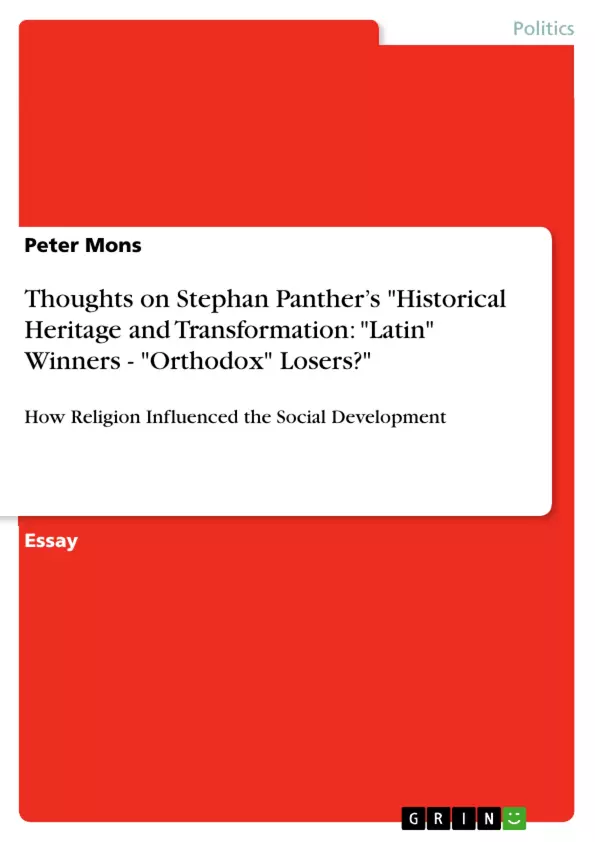The disintegration and final fall of the Soviet Union marked one of the most important events in european history. A new political order was created, as former Soviet satellites like Poland, Hungary and Bulgaria began to westernise and newly formed states like Belarus, Ukraine and Moldova declared their independence. What they had in common was a lack of democratic tradition, producing weak and unstable democracies. Stephan Panther evaluated these transformation processes of eastern european countries after 1989 and noticed differences in their individual success.
Inhaltsverzeichnis (Table of Contents)
- Historical Heritage and Transformation
- Latin Societies: A Higher Level of Development?
- Orthodox Societies: An Essential Influence on Transformation Performance?
- Formal and Informal Institutions
- Highly Developed Societies: Tolerance and Equality
- Lesser Developed Societies: Unstable Rights and Distrust
- Latin Civil Societies: Competition Between State and Church
- Orthodox Civil Societies: Consonant Relation Between State and Church
- The Border Between Developed and Underdeveloped Countries
- Religious Majorities in Central and Eastern Europe
- Economic Freedom Index
- Protestant Ethic and the Spirit of Capitalism
- The Weakness of Panther's Theory
- The Influence of Communism
Zielsetzung und Themenschwerpunkte (Objectives and Key Themes)
This text examines Stephan Panther's theory about the varying levels of development in Eastern European countries following the fall of the Soviet Union, specifically comparing Latin (Catholic) and Orthodox societies. It explores his argument that Orthodox countries have faced greater challenges in transforming to liberal democracies and flourishing economies due to inherent differences in their historical, societal, and religious structures. The analysis focuses on formal and informal institutions, religious beliefs, and economic freedom as key factors impacting development.
- The impact of historical and societal structures on post-Soviet transformation processes
- The role of religious beliefs, specifically Catholicism and Orthodoxy, in shaping societal development
- The significance of formal and informal institutions in promoting or hindering economic and political progress
- The correlation between economic freedom and societal development
- The limitations of Panther's theory in neglecting the influence of the communist era
Zusammenfassung der Kapitel (Chapter Summaries)
The text begins by outlining Stephan Panther's assertion that Latin societies have historically achieved higher levels of development than Orthodox societies, attributing this to the differing impact of religious beliefs on societal structures and transformations. This analysis delves into the influence of formal and informal institutions, highlighting how highly developed societies foster tolerance, equality, and trust, while less developed societies struggle with unstable rights, distrust, and a fear of long-term investments.
The text then explores the historical trajectories of Latin and Orthodox civil societies, contrasting the competition between the state and church in Latin societies, leading to secularization and the rise of a bourgeoisie, with the consonant relationship between state and church in Orthodox societies, characterized by centralized authority and limited autonomy for citizens. This comparison emphasizes the distinct societal structures and development patterns that have emerged in these regions.
The text concludes by examining the correlation between religious affiliation and economic freedom, presenting maps showcasing the dominant religious groups in Central and Eastern Europe and economic freedom rankings across Europe. This comparison further reinforces Panther's argument by demonstrating a general correlation between economic freedom and Catholic dominance, while Orthodox countries tend to have lower economic freedom scores.
Schlüsselwörter (Keywords)
The main keywords and focus topics of the text include: historical heritage, transformation, Latin societies, Orthodox societies, formal and informal institutions, religious beliefs, Catholicism, Orthodoxy, economic freedom, development, societal structures, post-Soviet transition, communist era, secularization, bourgeoisie, economic liberalism, Protestant Ethic, and the Spirit of Capitalism.
Frequently Asked Questions
What is Stephan Panther's main theory regarding Eastern Europe?
Panther argues that historical heritage, specifically the difference between Latin (Catholic) and Orthodox religious traditions, significantly impacts the success of post-Soviet transformation.
How do Latin and Orthodox societies differ in their state-church relations?
Latin societies historically featured competition between state and church, leading to secularization, while Orthodox societies often had a consonant relation with centralized authority.
What role does economic freedom play in Panther's analysis?
Panther notes a correlation where Catholic-dominant countries tend to have higher Economic Freedom Index scores compared to Orthodox-dominant countries.
What are formal and informal institutions in this context?
Formal institutions are official laws and structures, while informal institutions include societal values like tolerance, trust, and equality which promote or hinder development.
What is a major criticism or weakness of Panther's theory?
A significant weakness is the neglect of the 40-50 years of communist influence, which also shaped the institutions and mindsets of these transformation countries.
- Citation du texte
- Peter Mons (Auteur), 2021, Thoughts on Stephan Panther’s "Historical Heritage and Transformation: "Latin" Winners - "Orthodox" Losers?", Munich, GRIN Verlag, https://www.grin.com/document/986053



